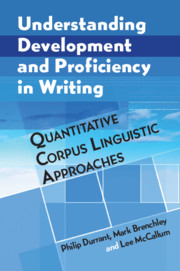Book contents
- Understanding Development and Proficiency in Writing
- Understanding Development and Proficiency in Writing
- Copyright page
- Contents
- Figures
- Tables
- Acknowledgements
- 1 Introduction
- 2 Theoretical and Methodological Foundations
- 3 Development in Syntax
- 4 Development in Vocabulary
- 5 Development in Formulaic Language
- 6 Development in Cohesion
- 7 Conclusions
- References
- Index
7 - Conclusions
Published online by Cambridge University Press: 26 February 2021
- Understanding Development and Proficiency in Writing
- Understanding Development and Proficiency in Writing
- Copyright page
- Contents
- Figures
- Tables
- Acknowledgements
- 1 Introduction
- 2 Theoretical and Methodological Foundations
- 3 Development in Syntax
- 4 Development in Vocabulary
- 5 Development in Formulaic Language
- 6 Development in Cohesion
- 7 Conclusions
- References
- Index
Summary
This chapter brings together discussions and evidence from the preceding chapters to draw conclusions about first- and second-language writing development and about quantitative corpus linguistics as a methodology. It first summarises the key patterns of development in terms of grammar, vocabulary, formulaic language, and cohesion. It then discusses implications of these findings for the key constructs of time- and quality-related development and draws methodological conclusions with regard to how quantitative measures of development have been, and in the future could be, theorised and operationalised and the types of text samples on which studies have been, and could be, built. The chapter ends by setting out a number of key priorities for future research, grouped under the headings of theorisation, broadening attention to contexts, and integration with other methods.
Keywords
- Type
- Chapter
- Information
- Understanding Development and Proficiency in WritingQuantitative Corpus Linguistic Approaches, pp. 201 - 214Publisher: Cambridge University PressPrint publication year: 2021

